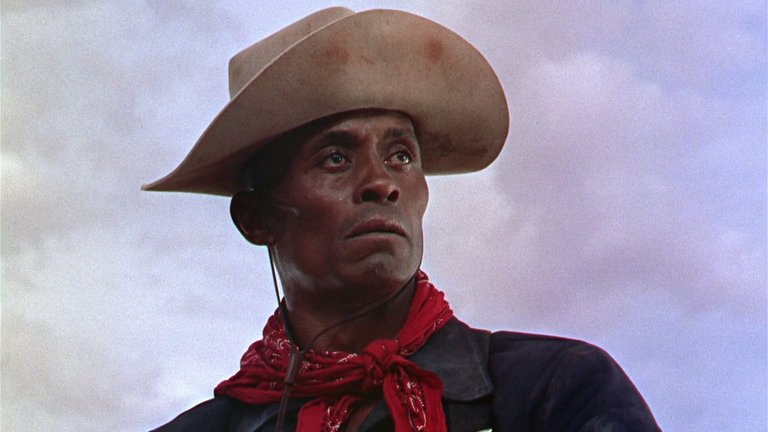
The hyperpartisan tribalistic divisions that characterise contemporary American society are not merely a modern phenomenon; they echo throughout the nation’s past, leading to the compartmentalisation of many grand historical figures into simplistic binary camps. John Ford, one of the titans of 20th-century cinema, finds himself largely perceived as a right-wing figure, primarily due to his Republican affiliations, his long-standing collaboration with right-wing icon John Wayne, and his classic Westerns that are often interpreted as celebrations of national mythology. However, if one were to assess Ford based on the thematic content and social commentary of his films rather than his political affiliations, he would arguably fit more comfortably within the left-wing or progressive faction of Hollywood. Some of his works, including the 1960 Western Sergeant Rutledge, exhibit a surprising forward-thinking quality that challenges prevailing racial attitudes and societal norms.
Set in August 1881 in the American Southwest, Sergeant Rutledge centres on First Sergeant Braxton Rutledge, portrayed by Woody Strode. Rutledge serves in the 9th US Cavalry Regiment, one of the all-black units known as "Buffalo Soldiers," a term coined by Native Americans. The plot deals with Rutledge being accused of raping and murdering a white teenager, Lucy Dabney (played by Toby Michaels), and killing her father. Despite his stellar service record and the respect he commands from both his white superiors—most notably Lieutenant Tom Cantrell (played by Jeffrey Hunter)—and his black subordinates who view him as a role model, Rutledge finds himself ensnared in a legal battle where racial prejudice looms large. Cantrell stands out as one of the few who believes in Rutledge's innocence, particularly after witnessing Rutledge's bravery in combat against an Apache war party when he had the chance to escape.
Today, Sergeant Rutledge enjoys a respectable reputation within cinematic circles, although it is seldom regarded as one of Ford's finest works. Its historical significance lies in its status as the first major Hollywood film featuring a black title character as an actual protagonist. Woody Strode's performance is noteworthy; he embodies a stoic yet deeply human character whose presence rivals that of John Wayne in Ford's other films. Strode effectively conveys Rutledge’s internal struggles stemming from his traumatic past as a former slave and his experiences with systemic racism as a free man.
Released during a pivotal time when racial issues were at the forefront of American public discourse due to the civil rights movement, Sergeant Rutledge presents a script by James Warner Bellah and Willis Goldbeck that adopts a distinctly progressive stance against racism. The film critiques not only overt racism but also subtler manifestations of prejudice, such as white discomfort with interracial proximity. This theme is exemplified through Captain Shattuck (played by Carleton Young), the ruthless prosecutor who exploits societal biases to bolster his case against Rutledge. Even within their own ranks, black characters exhibit caution around white women, highlighting the oppressive atmosphere they navigate.
The concept of miscegenation remains a contentious issue throughout the film; it was still illegal in many Southern states during this era. This societal discomfort may partially explain why Sergeant Rutledge underperformed at the US box office while achieving better reception abroad in countries less burdened with racial tensions.
Despite its ambitious themes, Sergeant Rutledge is not without its shortcomings. The film tends to meander at times, feeling slightly overlong. Ford employs a trial narrative frame that occasionally indulges in humour through characters like presiding judge Lt. Col. Fosgate (played by Willis Bouchey) and his wife Cordelia (played by veteran Billie Burke in her film screen role)—elements that detract from the film's serious undertones. While these moments may have been intended to lighten the mood, they disrupt the film’s pacing and dilute its impact.
Moreover, from a contemporary perspective, the depiction of Cantrell as the noble white saviour poses significant issues. While Rutledge embodies strength and resilience, it is ultimately Cantrell who extricates him from peril—a narrative choice that reinforces problematic stereotypes about race and heroism. The romantic subplot involving Mary Beecher (played by Constance Towers) further complicates matters; her character conveniently intersects with events that lead to Rutledge’s exoneration. This melodramatic resolution feels contrived and undermines the film’s earlier attempts to address serious racial injustices.
Despite these narrative flaws and problematic portrayals, John Ford’s directorial prowess shines through in Sergeant Rutledge. His ability to navigate these heavy limitations speaks volumes about his skill as a filmmaker. The film remains well-acted and expertly directed, featuring action sequences shot at Ford’s beloved Monument Valley—locations that have become iconic within the Western genre. Even stripped of its historical context, Sergeant Rutledge stands out as a classic Western from Hollywood's golden age.
RATING: 7/10 (+++)
Blog in Croatian https://draxblog.com
Blog in English https://draxreview.wordpress.com/
InLeo blog https://inleo.io/@drax.leo
Hiveonboard: https://hiveonboard.com?ref=drax
Rising Star game: https://www.risingstargame.com?referrer=drax
1Inch: https://1inch.exchange/#/r/0x83823d8CCB74F828148258BB4457642124b1328e
BTC donations: 1EWxiMiP6iiG9rger3NuUSd6HByaxQWafG
ETH donations: 0xB305F144323b99e6f8b1d66f5D7DE78B498C32A7
BCH donations: qpvxw0jax79lhmvlgcldkzpqanf03r9cjv8y6gtmk9
Posted Using InLeo Alpha

